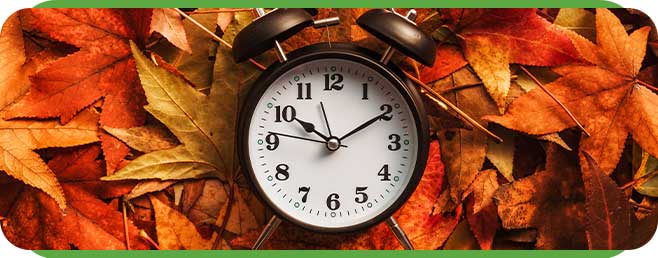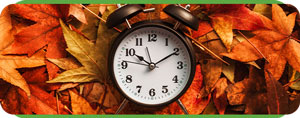Daylight Savings (Falling Back) Sleep Q&A
If you want to know more about the impact of daylight saving, contact our providers today at Koala® Center For Sleep & TMJ Disorders. For more information, contact us or visit us online to book an appointment. We have convenient locations across the U.S. in Bloomington IL, Peoria/ Dunlap IL, El Paso TX, and Wausau WI.


Table of Contents:
What does it mean to fall back on daylight savings?
Do you lose sleep during fall back?
How do you take advantage of daylight savings?
Do we gain an hour or lose an hour of sleep?
Daylight savings time (DST) is an annual event in the United States that changes the clock time by one hour. DST begins on the second Sunday of March and ends on the first Sunday of November; however, certain states, such as Arizona, do not practice Daylight Savings. This change allows people in the Northern Hemisphere to have an extra hour of sunlight in the morning during the winter time. Consequently, the sun sets an hour earlier, making the evening shorter.
The common saying “fall back” in relation to daylight savings time refers to setting the clock back an hour (e.g., from 9 AM to 8 AM). This axiom works doubly, as the time where clocks are set back an hour occurs in fall, hence “fall back”. There is an equally pithy saying for the start of daylight savings in March, “spring forward”. “Fall back” occurs in fall and turns the clock back an hour; “spring forward” occurs in spring and turns the clock forward an hour.
No, most people do not lose sleep during fall back, as there is an extra hour that is most commonly used for sleep. Therefore, most people get extra sleep during fall back, which provides many benefits for one’s wellbeing.
Most people have a bittersweet relationship with daylight savings time; while we gain an extra hour in the fall, we lose it in the spring. This can be confusing for some people, and may even be annoying to others, but if you live in a region that practices daylight savings, it is important to make the most of it.
Most people do not like the idea of one less hour of sleep, but you can prepare in advance to mitigate tiredness and improve alertness. However, in autumn, we turn back the clocks, providing the opportunity to catch up on sleep. This extra hour of sleep can provide many advantages for one’s physical health and mental wellbeing. In fact, there are fewer vehicular accidents than normal during the fall time change and less demand for medical attention for a few days after we set back the clocks. Furthermore, there is a reduction in crime during daylight savings, particularly robbery, which sees a decrease by 7 percent. During the evening, which sees more light with DST, there is a 27-percent reduction in robbery; more light means less obfuscation of activities.
In the spring, when we turn our clocks ahead an hour (spring forward), we lose an hour of time, which means less sleep. On the contrary, in autumn, when we move our clocks back an hour, we gain an extra hour of time to sleep. This annual tradition can be perplexing for some, but having an extra hour of daylight in the evening can allow you to enjoy the outdoors for longer and lower your energy consumption, as you can use more natural daylight and less artificial lighting.
If you have questions about daylight savings time and how it affects your sleep, the sleep team at Koala® Center For Sleep & TMJ Disorders can help you find the answers. Call us today to book an appointment, or visit one of our locations!

Additional Services You May Need
▸ KoalaKIDZzz®
▸ Sleep Apnea
▸ Snoring
▸ TMJ Disorder
▸ Fatigue
▸ Sleep Disorders
▸ Weight Loss
▸ CPAP Alternative
▸ Oral Appliances




